
Friday, 25th February, 2022 was another memorable time for the Stroke Survivors’ Support and Rehabilitation Club of Nigeria.
With another edition of the quarterly meeting of persons who have survived a stroke held at the Federal Medical Centre, Abeokuta, it was all excitement, fun and learning for the participants.
The programme anchored by PT Owoola commenced at 9am with blood pressure and other vital signs screening of the participants. Afterwards, every attendee was treated to a welcome of light intensity exercises by PT Adekunle. From the bright appearance of the participants, it was certain that they all had a wonderful time. After all, who doesn’t enjoy the rush of endorphins before some talk on improving life’s quality after a stroke?

The main discussion of the day was an enlightening session on speech problems that could occur after a stroke. For this, a speech and language pathologist was present to provide a comprehensive explanation and practical answers to all questions the participants have on the topic.
The resource person, Mr Stephen Ogunroumbi, from the Speech and Language Pathology Department of the Federal Medical Centre, Abeokuta spent quality time explaining what leads to speech problems after a stroke.
Let us recall that a stroke is a blood vessel accident in the brain. Also, a part of the brain is responsible for the understanding and production of language. When we consider these, it becomes clear how a stroke can affect the speech centres in the brain. With this happening, challenges can occur with either speaking or understanding what is said.

Thus, speech problems after a stroke are usually challenging. Often, a person who is jovial and eloquent may become almost the opposite if a stroke affects the speech centres. The resource person also highlighted some of the challenges that can accompany speech impairments after a stroke. These challenges may include inability to communicate objects, recall names, make interactions and express feelings or opinions.
Going further, Mr Ogunroumbi provided a number of coping strategies that could help when such challenges occur. This may include improvising for names of items that cannot be communicated or recalled during discussions. For example, when a mobile phone is forgotten, the phrase “what we use to make calls” can be employed.
However, the speech therapy practitioner emphasized the need for professional intervention in cases of speech problems after a stroke. The best help and care for speech difficulties after a stroke can be obtained from speech and language therapists. These professionals are experts in identifying the type of speech difficulty and providing the appropriate line of management. Usually, this care is specific to individuals on the basis of the type of challenges they have with either speaking or understanding what is heard.
After the educational session, the participants were given the opportunity to ask their questions which were skillfully addressed by the resource personnel.

The meeting ended with a nice healthy diet of organic fruits and water. After all, eating healthy is always of essence.
Until the next edition of the SSSRCN meeting, stay safe and monitor your blood pressure.

Thank you for this update. We are grateful